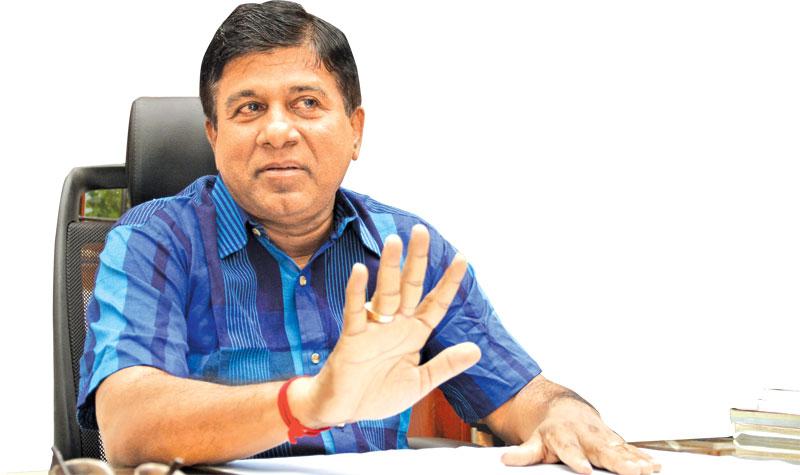
At the moment, the two main political parties are engaged in a sort of “battle”to hammer out a new constitution, to fully accommodate the aspirations of the people. In this connection, the Sunday Observer spoke to Ministers Susil Premajayantha and Wijeyadasa Rajapakshe to secure their views on the issue.
Justice Minister, Dr. Wijeyadasa Rajapakshe says, the constitution making process is being done with the consent of all Parliamentarians, and our main concern is the need of the country.
In an interview with the Sunday Observer, the Minister said, we are not going to draft a UNP Constitution or an SLFP Constitution. The Constitution is for the Republic of Sri Lanka. Therefore, it is not a matter of UNP or SLFP, we have to reach a consensus on what is best for the country.
Q: Is there an actual need for a new constitution or to amend the present constitution, to resolve outstanding problems?
A. That depends on the opinion of the people. A constitution is for the people. Since 1994, commencing with former President Chandrika Bandaranaike Kumaratunga, all Presidents came to power promising the people that they would introduce a new constitution.
We all know that making a new Constitution is a long process and a protracted issue.
When the Common Candidate was brought forward at the last Presidential Election, we promised the people that until a new constitution is formulated, we would move amendments to accommodate immediate and urgent changes.
This we have already done. Whether the people need a new constitution or not is basically not for politicians, but for the people themselves.
Q: The office of the Presidency is a must, according to one school of thought, considering national security, while others want to abolish it. What are your views?
A. Actually, I am involved in the business of making the new constitution. Therefore, my opinion at this juncture will not be desirable.
We will wait for that. If we feel the majority wants to abolish the Executive Presidency, we are for it; if the majority wants to retain it, we are also for it.
Q: The recommendations of the Constitution Task Force on Transitional Justice and Reconciliation have become controversial. What is the Government’s attitude towards it?
A. We are not considering it. There is no need for us to have a controversy because none of it has been finalized. Whether we accept or reject it, is exclusively a matter of discretion for the main operation committee and the Constitutional Assembly.
Q: Apparently, there seem to be no serious dialogue on Constitution making between the SLFP and the UNP. Eventually, could there be a consensus on a new Constitution?
A. There has to be serious dialogue. When a new Constitution is to be formulated, serious views should be forthcoming. The Constitution is an important document, and forms the basic law of the country. Unless we have crucial dialogue, we can’t bring in a new Constitution.
Q: Some jurists maintain that the Soulbury Constitution could still weather any political storm as it did in the 1971 insurrection and the 1962 coup case, compared to the 1972 and 1978 Constitutions. Your views?
A. Coups are not matters related to the Constitution. Under the Soulbury Constitution, we witnessed the 1962 coup and the 1971 insurgency. Under the first Republican Constitution of 1972, a terrorist movement emerged and continued under the 1978 Constitution, for 30 years. There was another insurgency in 1987-1988. It is not merely a matter of Constitution, but the Constitution should have a strong mechanism or system to control the situation.
Q: There are allegations that some NGOs and the Tamil diaspora are inclined towards a federal form of Constitution which has caused fear among the Sinhala majority. Could you elaborate on this?
A. We are the people who make the Constitution. Anybody can bring forward any of their suggestions. Whether to accept or reject them is a matter of discretion, finally to be endorsed by the Constitutional Council and also the people, by a referendum.
Q: Has the UNP and the SLFP decided to commence discussions on the Constitution making process or has any time frame been worked out for this?
A. It doesn’t arise. Why did they agree for a Constitutional Assembly, and vote for it. And then, six Sub Committees were appointed and a main Committee was also appointed. All these were done with the consent of all the MPs in Parliament. It is not a question of SLFP or UNP. The process is going on with the consent of all.
Q: What are the key areas that the UNP has looked at in the Constitution making process?
A. Our key area is what is really needed for the country.We are not going to draft a UNP Constitution or an SLFP Constitution. The Constitution is for the Republic of Sri Lanka.
Therefore, it is not a matter of UNP or SLFP. All have to agree on what is best for the country.
